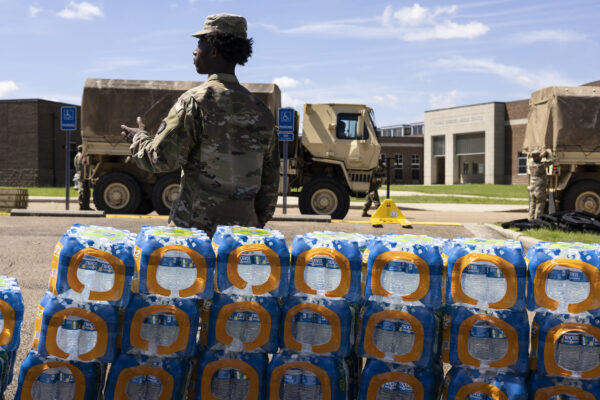The federal government has come to an agreement with officials from Mississippi to help solve the water crisis in the capital, Jackson. The same day this commitment was made, the Justice Department also filed a complaint on behalf of the Environmental Protection Agency (EPA) against the city of Jackson.
Over the summer, the city of Jackson’s water was declared too dirty to drink, use for bathing, or washing.

On Friday, July 29, a boil-water notice was issued for the city. A month later, after “excessive rainfall and extreme flooding,” the water system shut down, leaving about 160,000 residents in the city and surrounding areas without water.
From the end of July to Tuesday, Sept. 6, when the water pressure was restored, people in the area had no running water to drink or use for basic hygiene and safety purposes. Running water was not available for them to wash their hands, shower, flush toilets, or wash dishes regularly. The lack of running water also caused a civil service issue as firemen were not able to fight fires with the toxic water that could have been flammable.
Even after the full pressure was restored, the boil-water notice remained in effect until Thursday, Sept. 15.
During this time, Democratic Sen. Chuck Schumer of New York worked with Metro IAF/EBC to secure money to help with the crisis.
“Our water system crashed not because of an event but because of years of neglect and environmental racism,” a clergy member said to Schumer, the majority leader of the United States Senate.
“While everybody else was silent you, and EBC stood up for us,” the preacher continued. “You secure for us $20 million. Our children, today, are drinking clean water because of you. There are mothers who are able to give formula to their kids and others because of that.”
But that money, though helpful, was only a band-aid.
After months of the state and the municipality not being able to swiftly fix the problem, U.S. authorities have become interested in a proposal to help solve the water issue.
“Today, the United States filed a proposal in federal court that — if approved by the court — would appoint an Interim Third-Party Manager to stabilize the city of Jackson, Mississippi’s public drinking water system, and build confidence in the system’s ability to supply safe drinking water to the system’s customers,” the DOJ announced in a press release.
The two parties who signed the order, agreeing to these terms to go forward, are the city of Jackson and the Mississippi State Department of Health (MSDH).
In the court filings, the plan is called a “proposed stipulated order,” and was created to serve as “an interim measure” while the federal government, the state, and the city figure out a judicially enforceable consent decree that would point to a sustainable long-term solution for the system. It will also push to make sure the city’s compliance with the Safe Drinking Water Act (SDWA) and other relevant laws is maintained.
There are four line items in the plan that include the following points:
- (1) Operate and maintain the city’s public drinking water system in compliance with SDWA, the Mississippi Safe Drinking Water Act, and related regulations;
- (2) Take charge of the Water Sewer Business Administration, the arm of the city responsible for billing water users;
- (3) Implement capital improvements to the city’s public drinking water system, in particular, a set of priority projects meant to improve the system’s near-term stability, including a winterization project meant to make the system less vulnerable to winter storms; and
- (4) Correct conditions within the city’s public drinking water system that present, or may present, an imminent and substantial endangerment to the health of the city’s residents.
In addition to the proposal, the Justice Department has filed a lawsuit against the city on behalf of the people. The claim alleges officials in Jackson failed to “provide drinking water that is reliably compliant with the [SDWA] to the system’s customers.”
Attorney General Merrick B. Garland said, “Today the Justice Department is taking action in federal court to address long-standing failures in the city of Jackson’s public drinking water system.”
“The Department of Justice takes seriously its responsibility to keep the American people safe and to protect their civil rights,” Garland continued in the statement. “Together with our partners at EPA, we will continue to seek justice for the residents of Jackson, Mississippi. And we will continue to prioritize cases in the communities most burdened by environmental harm.”
EPA Administrator Michael S. Regan said he spent the last year meeting with people on the ground in Jackson. He said the people told them they had “struggled with access to safe and reliable water for years.”
Regan stated, “I pledged that EPA would do everything in its power to ensure the people of Jackson have clean and dependable water, now and into the future.”
Adding, “While there is much more work ahead, the Justice Department’s action marks a critical moment on the path to securing clean, safe water for Jackson residents. I’m grateful to the Attorney General for his partnership and commitment to this shared vision.”
Investigations proved what many had suspected based on the racial makeup of those most impacted by the toxic water. Race and economics played a key role in the neglect and failure to maintain the system.
In September, a civil rights class action lawsuit was filed against the city by citizens for their failure to provide clean drinking water. According to the claim, more than 82 percent of the population in Jackson identify as Black or African-American, compared to the overall population of the state of Mississippi which is almost 60 percent white.
The lawsuit also states a quarter of Jackson residents are not only Black but currently live below the poverty line.
These stats, and the nature of this vulnerable population, also fueled the federal claim, according to officials.
“Every American — regardless of where they live, their income, or the color of their skin — deserves access to safe, reliable drinking water,” said Assistant Attorney General Todd Kim of the Justice Department’s Environment and Natural Resources Division.
“For many years now, the people of Jackson have lived in uncertainty — uncertainty about whether, on any given day, the water that flows from their taps will be safe to drink. With our court filings today, we have taken an important step towards finally giving the people of Jackson the relief they so desperately deserve.”
The only way that this crisis can be toppled is if the “providers of drinking water comply with federal and state laws designed to ensure the safety of the water,” said U.S. Attorney Darren J. LaMarca for the Southern District of Mississippi.
He believes through this lawsuit, the US government “will act to ensure that the city of Jackson’s water system will be compliant with the Safe Drinking Water Act and other state and local regulations so that those serviced by the system can have confidence that the water they are consuming is safe.”
The proposed and the lawsuit are the options they believe will move Jackson to a more healthy water solution.


